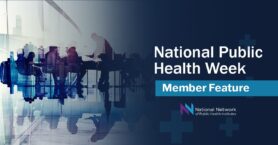#ThankYouPublicHealthInstitutes: Rachel Wilfert
- By: National Network of Public Health Institutes
- Date
JOIN US IN CELEBRATING PUBLIC HEALTH TRAINERS ACROSS THE COUNTRY DURING NATIONAL PUBLIC HEALTH WEEK
Name: Rachel Wilfert
Title: Director, Workforce Training and Education
Organization:
North Carolina Institute for Public Health
UNC Gillings School of Global Public Health
How did you get into training in public health?
By accident, sort of! I was recruited to join the North Carolina Institute for Public Health to help manage some of our preparedness projects. Many of them had a training focus – online training, in particular. I fell in love with workforce development activities and have been doing them ever since.
How do you approach training adults for continued learning?
We start by assessing the needs of our learners and then develop engaging, competency-based programs that address those needs. We also incorporate continuous quality improvement through evaluation so that we can see how learning is being transferred into the workplace and update our programs to make them more useful in future. Last, but definitely not least, we rely on our long-standing collaborations with public health partners to build our programs.
What has been the biggest challenge related to training and workforce development over the last year?
We’ve had two, I think. First, like many other organizations we had to move all of our courses online and think deeply about how to deliver training content in new ways. We also had to recognize that our learners were beyond busy and to think how best to structure our programs so that we could provide them with the flexibility they needed.
What topics or skills have you found lack training opportunities but are needed in the field of public health?
In line with national trends, in North Carolina we’re seeing the need for training in strategic skill sets such as problem-solving, systems thinking, resource management and others. In particular there is a need for the types of trainings often found in the business sector but adapted for a public health context. We are also seeing an ongoing need for leadership development programs that can help support our public health leaders to better navigate the incredible changes we’re seeing within public health.
What advice do you have for others in training or workforce development?
Meet learners where they are at and think about what they need to do in their daily jobs. Sometimes as training professionals we can get caught up in what we want people to know as opposed to what they actually need – which means we can overload learners. If we center on building practical, applicable skills, we can better focus our learning opportunities and have a much bigger impact on the public health workforce.


 Subscribe To Our Communications
Subscribe To Our Communications